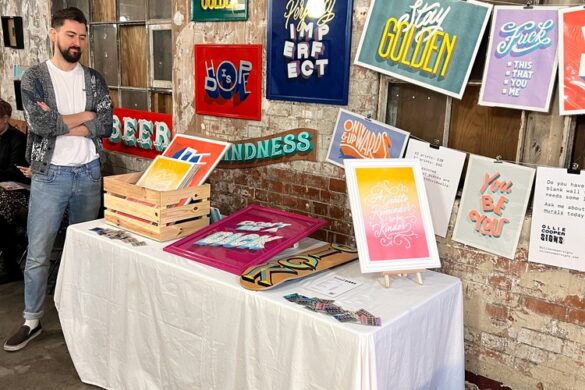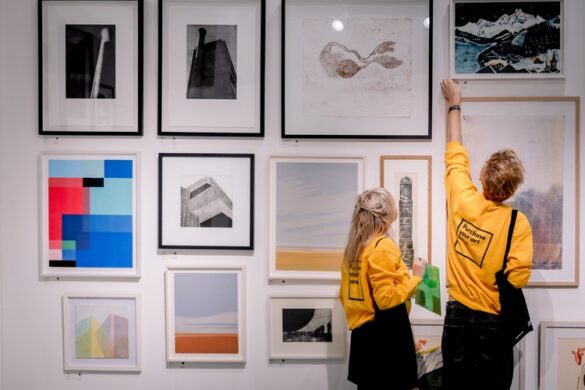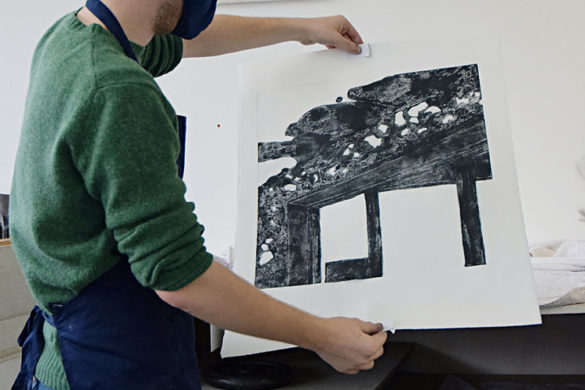Beloved by everyone from punks to grebos, indie filmmakers, grungers, viral meme dog-celebrities, Avril Lavigne and a large percentage of suburban teenagers, skateboarding has had a hugely significant impact on culture.
Film, music, fashion, photography and fine art all owe a fair bit to skateboarding, as is demonstrated in a new exhibition at Somerset House in London called No Comply. The free exhibition explores skateboarding and its impact on communities and culture over the past 45 years.

Aimée Gillingwater, No Comply,
Southbank, 2018 © Jenna Selby

Helena Long, Stockwell © Rich West
According to the No Comply team, skateboarding thrived across the UK during lockdown, with the sport seeing its biggest increase in uptake since 2000. It says that up and down the country there are more than 750,000 skateboarders and 1,500 active stake parks, and adds that for the first time in history, skateboarding will feature in the Olympic Games.
But despite its popularity, the story of the sport’s influence has remained largely untold; hence No Comply’s aim to “unpack the dynamic story of skateboarding in the UK” through three themes that define the subculture’s ethos: the city as playground, skateboarding communities and DIY culture.

Dick’s Bowl, from the series DIY,
Oxford, UK, 2012 © Rich Gilligan

Lucien Clarke, Switch Backside
Noseblunt Side © Sam Ashley
The show is curated by Tory Turk from an original idea by Frankie Shea, with insight from British skateboarder and Somerset House visitor experience manager Helena Long.
Photographic imagery is a key part of the show, with works from some of the community’s biggest names including Wig Worland, Sam Ashley, Henry Kingsford, Jenna Selby and Norma Ibarra. There are also a number of newly commissioned original films that explore “the freedom of skateboarding and its community,” says Somerset House.
The influence of skateboarding on fashion, and of skatewear on “skateboarding’s collective identity” is explored through archive objects and photography featuring brands including Palace Skateboards, Virgil Abloh and Louis Vuitton.
Grassroots campaigns and non-profit initiatives that help to promote positive change through skateboarding are represented by case studies looking at the likes of SkatePal and Free Movement Skateboarding. Archival objects, photographs and anecdotes tell the stories of initiatives like Long Live Southbank, the artist- and community-led campaign signs the closure of the Undercroft of the Southbank Centre, probably the capital’s most prominent, visible skate site.

‘Here to win’ © Katie Edwards
Among the highlights of the DIY Culture section of the exhibition are a number of early editions of skate-based publications such as Alpine Sports, Read and Destroy (R.A.D) and Skateboard!, which has been attributed to helping connect skateboarders across the UK during the 1970s and 80s hanks to its mapping of skate-spots around the country. These mags are presented alongside more recent titles including Confusion Magazine, Over Ply Wood, Dogpiss, Blood Fever and Do I Look Like I Care.

Jørn Tomter, Hackney Bumps,
London 2020 © Jørn Tomter

Upside Down, Barbican,
London, October 2015 © David
‘Dog’ Vivaldini
Fans of nostalgia and gaming will be pleased to know that visitors to No Comply will be able to see the first video game going players the chance to experience street skateboarding in a UK location in action: the 1999 Playstation Game Thrasher Presents Skate and Destroy has got a specially created display showing playback footage on an original monitor and console from its heyday. Elsewhere, Somerset House itself has been transformed for the exhibition (in a render, at least) into a “skateable site” thanks to urban spaces design studio Betongpark.

Iain Borden, 1980. Rom skatepark. Copyright the artist.
The show has been developed by design agencies Studio LP and Interesting Projects, which also worked together on the Design Museum’s Sneakers Unboxed show.
The exhibition runs from 19 July – 19 September 2021
- Autobahn - November 26, 2021
- Alphabetical - November 12, 2021
- SOFA Universe - November 8, 2021





